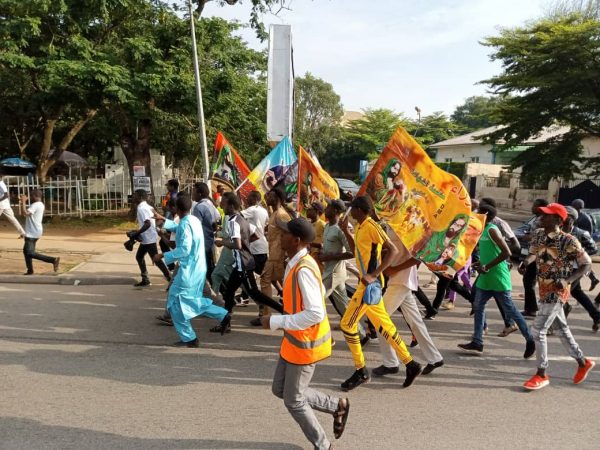The International Quds Day procession in Abuja, Nigeria, on the last Friday of Ramadan 1446H, met with a violent confrontation between members of the Islamic Movement in Nigeria (IMN), also known as the Shiite group, and personnel of the Nigerian Army. This annual event, established by Imam Khomeini, serves as a global demonstration of solidarity with oppressed peoples worldwide, particularly the Palestinians. While similar processions occurred peacefully in numerous countries across the globe, the Abuja event devolved into chaos and violence. The IMN alleges that the Nigerian Army used live ammunition against their peaceful procession, resulting in several injuries and fatalities, including women and minors. The Army, however, claims that the Shiite protesters initiated the violence, disrupting law and order, which necessitated their intervention. This conflicting narrative underscores the critical need for an impartial investigation to determine the true sequence of events and hold those responsible accountable.
The IMN spokesperson, Sheikh Sokoto, reported that the procession began peacefully after Friday prayers at a mosque in Banex Plaza, with participants intending to march toward Wuse market. According to his account, an army armored vehicle blocked their path, and soldiers opened fire on the protesters without provocation. He emphasized that the participants, including a significant number of women and minors, were unarmed and posed no threat. Sheikh Sokoto also stated that while the exact number of casualties remains unconfirmed, eyewitness reports indicate at least five fatalities and numerous life-threatening injuries. He promised to provide further updates as more information becomes available, highlighting the IMN’s commitment to transparency and accountability. His account paints a picture of unprovoked aggression by the Nigerian Army against peaceful protestors, raising serious concerns about human rights violations.
Contrary to the IMN’s narrative, the Nigerian Army spokesperson, Major General Onyema Nwachukwu, presented a different version of events. He confirmed the confrontation, acknowledging the Shiite protest but claiming ignorance of its specific purpose. He stated that the protestors became violent, disrupting law and order, and subsequently engaged the troops. While admitting to an exchange of fire, he stated he could not confirm any casualties. This stark contrast in accounts underscores the urgency of an independent investigation to ascertain the truth and ensure accountability for any wrongdoing. Without such an investigation, the conflicting narratives risk further escalating tensions and fostering distrust between the IMN and the Nigerian authorities.
The incident in Abuja is not an isolated event but rather the latest in a series of clashes between the IMN and Nigerian security forces. This pattern of confrontations raises serious questions about the use of force against peaceful protestors and the potential for human rights abuses. The IMN’s consistent call for peaceful demonstrations and their emphasis on religious freedom stand in stark contrast to the frequent violent responses from security forces. This recurring pattern of violence necessitates a thorough review of security protocols and engagement strategies to prevent further bloodshed and protect the fundamental right to peaceful assembly.
The IMN has formally requested an independent investigation into the Abuja clash, appealing to relevant authorities to safeguard the constitutional right to peaceful assembly. They insist on a thorough and impartial inquiry to determine the facts of the incident and hold those responsible accountable for the violence. This call for an independent investigation reflects the IMN’s commitment to due process and the rule of law. It also underscores the importance of transparency and accountability in addressing situations where state security forces clash with civilian populations.
The clash between the IMN and the Nigerian Army during the International Quds Day procession in Abuja highlights complex issues of religious freedom, freedom of assembly, and the use of force by state security forces. The conflicting accounts of the incident emphasize the urgent need for an independent investigation to establish the facts, determine responsibility, and prevent future occurrences. The investigation should include gathering eyewitness testimonies, reviewing available video footage, and analyzing forensic evidence. Furthermore, the investigation should examine the broader context of previous clashes between the IMN and security forces to identify any systemic patterns of violence or human rights abuses. The findings of the investigation should be made public to ensure transparency and accountability, and appropriate measures should be taken to address any identified wrongdoing and prevent future incidents. Ultimately, protecting the fundamental rights of all citizens, including the right to peaceful assembly and religious expression, is paramount to maintaining a stable and just society.


